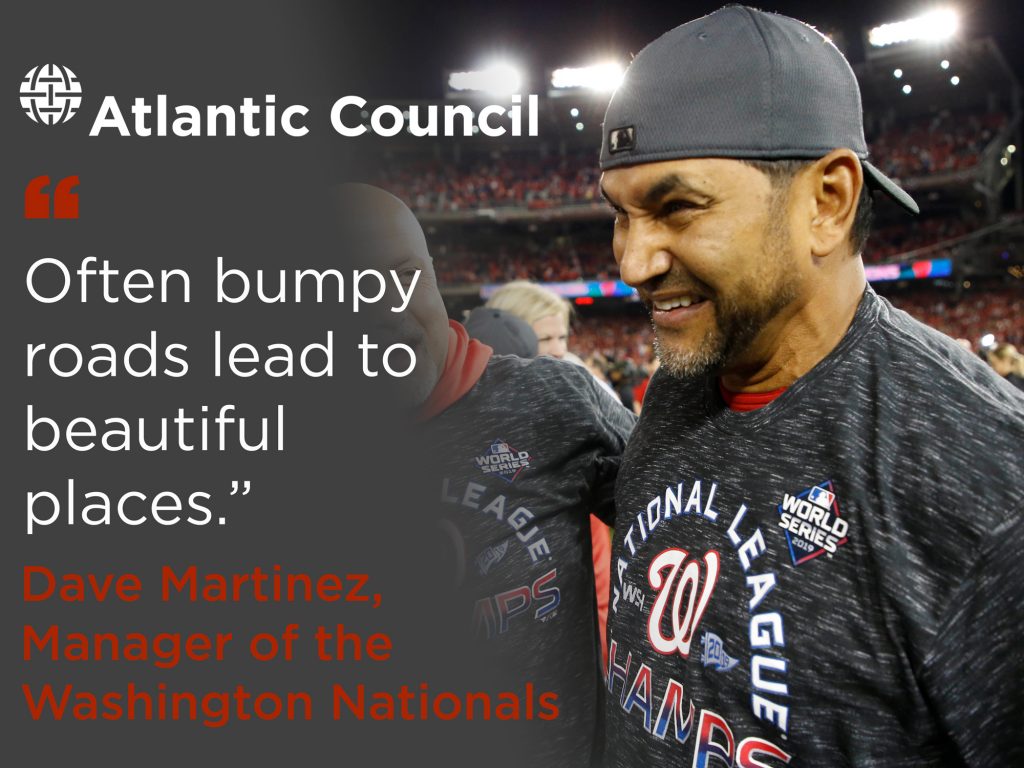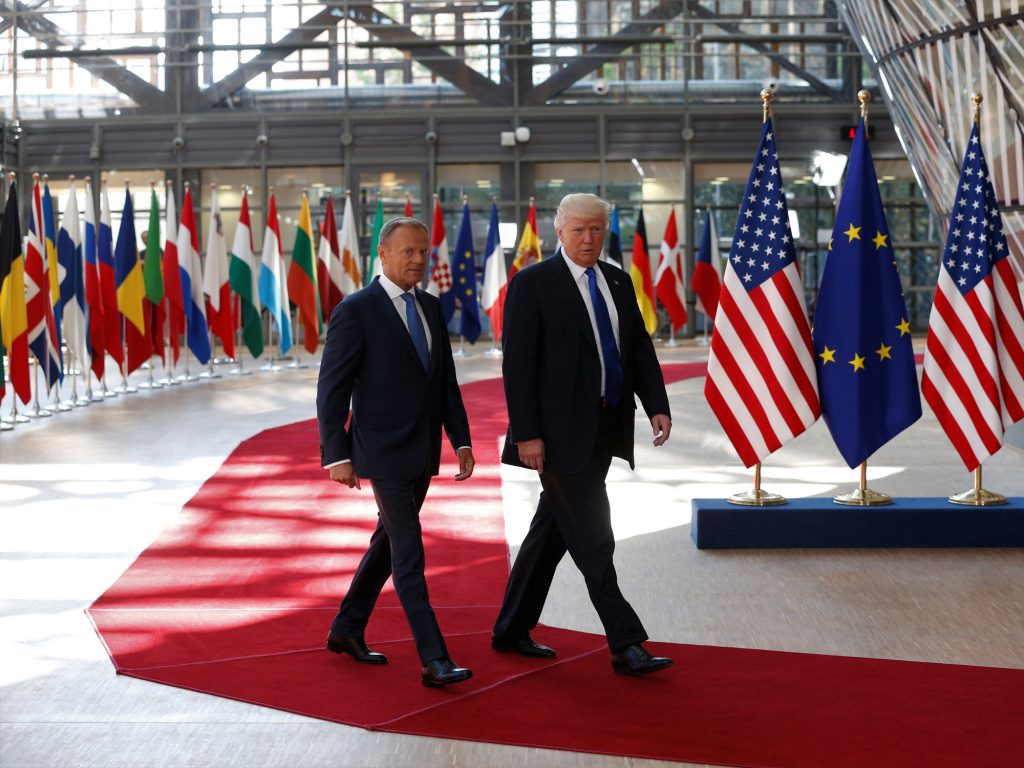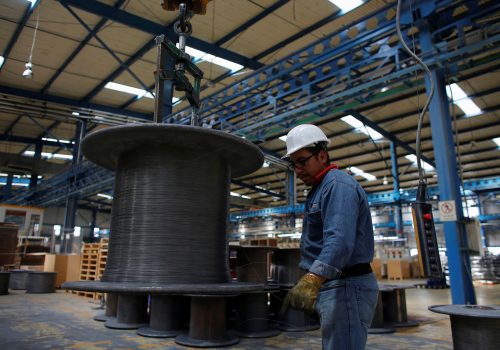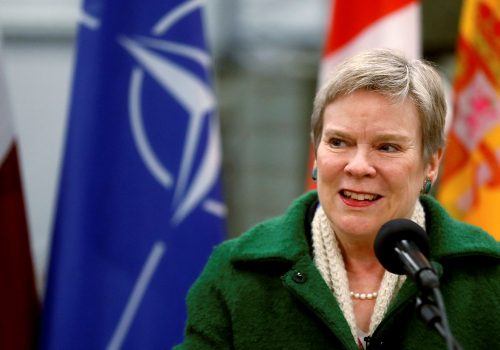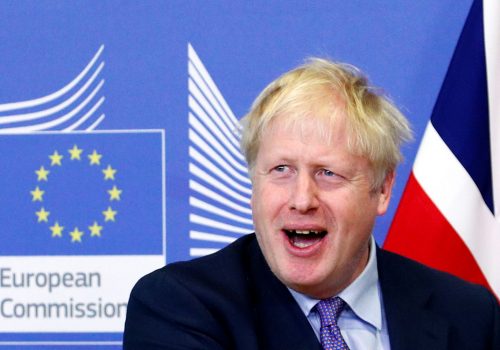Key Points
- Although President Trump’s own National Security Strategy has shifted American focus to tackling our new era of major power competition, he continues to engage in trade skirmishes with the allies he needs most for this larger struggle.
- If Trump wishes to achieve any of his foreign policy goals, from China, to North Korea and Iran, he will have to work with engaged and cooperative allies.
- Little will be accomplished in the interest of the United States and its allies, at this defining moment in global history, should alliance structures and trust deteriorate further.
Some $7.5 billion of
new US trade tariffs on the European Union, which went
into effect yesterday
(Friday), underscore one of the most befuddling aspects of the Trump presidency.
Although President Trump’s own National
Security Strategy has shifted
American focus to tackling our new era of major power competition, he continues
to engage in trade skirmishes with the allies he needs most for this larger
struggle.
Recent days have left even Trump administration
loyalists and insiders – both current and past — scratching their heads about
the degree to which President Trump has been doubling down on what they
consider one of his most consistent and counter-productive traits, one that is
apparent from Syria’s war zone to the Brussels Eurocracy.
Off-the-record, they’ll tell you that they’ve been
unable to convince the President that disregarding, mistreating and, most
recently, even abandoning allies (as recently has been the case with Syrian
Kurds) runs counter to achieving President Trump’s loftiest foreign policy
objectives, most of which they support.
If President Trump wishes to change China’s unfair
economic practices, if he wishes to tackle Iran as a malevolent actor, if he
wishes to pressure and negotiate North Korea away from its nuclear weapons or
to transform Venezuela from a rogue dictatorship to a democratic contributor –
and it is hard to quibble with any of those goals – getting there requires
engaged and cooperative allies.
These insider critics think now would be an ideal
time to deploy what until recently was America’s greatest, global competitive
advantage: its international, interlocking system of allies and alliances, both
informal and those formalized by treaty. Instead, across several fronts the
United States has taken actions that have raised doubts among allies, who feel
the geopolitical tectonic plates shifting beneath their feet.
On that score, Secretary of State Mike Pompeo was
in the Middle East this week reassuring Israeli leaders, among others, that the
President’s decision to withdraw troops from northeastern Syria – which faced
an unusual bipartisan rebuke from Democrats and Republicans in the House
of Representatives – wouldn’t influence America’s other obligations.
It was telling that his trip came on the heels of
Russian President Vladimir
Putin’s own trip this week to
the region, where US allies Saudi Arabia and the UAE both provided him
red-carpet treatment. On a recent trip to the Middle East, what I heard from
some of our closest friends was that as much as they prefer close relations
with Washington to those with Moscow, they must deal both with the reality of
Russia’s growing presence in their region and greater consistency.
Said the Economist this week, “However understandable the
frustration (with the Middle East), the thoughtless abandonment of the region
would be self-defeating. It undermines America’s credibility around the world,
which means that the United States will have to work harder and spend more to
get its way on issues that are vital to its people’s prosperity and their way
of life.”
The magazine lists potential knock-on effects that
include Turkey’s continued drift from NATO and increased alliance divisions,
Putin’s potential test of the Baltic states on Russia’s border, the Taliban’s
doubling down to test American resolve in Afghanistan, and China’s likely
determination to “steadily press its territorial claims against its neighbors.”
Get the Inflection Points newsletter
Subscribe to Frederick Kempe’s weekly Inflection Points column, which focuses on the global challenges facing the United States and how to best address them.
On trade issues, the Trump administration’s first “own goal” regarding China came at the beginning of the administration when it walked away from talks toward a Transpacific Partnership (TPP) agreement that would have created a crucial regional free-trade counter to China’s growing economic leverage across Asia. The other eleven partners in the negotiation, which began under the Obama administration, signed an agreement, but the US was left on the sidelines, giving the deal less global weight and Washington little benefit.
If transatlantic trade negotiators had started with the premise that working cooperatively with European partners is a growing priority at this historic moment, they would have begun working months ago at heading off Friday’s ratcheting up of the US-European trade dispute – with 10% tariffs on aircraft and 25% on goods such as cheese, wine and whisky — realizing common cause would be required as talks with China near their end-game.
For example, with US leadership, the two sides could have headed off what will likely now become a tit-for-tat set of punitive tariffs that will harm both Airbus and Boeing at a time when the real, rising threat to their duopoly globally inevitably will come from China. While it is true that the latest round of aircraft tariffs had the blessing of the World Trade Organization, it is also likely that a new WTO finding in coming months will result in retaliatory EU tariffs on Boeing.
Instead of the introduction of new US tariffs on other European goods this week – potentially to be followed in mid-November with new auto tariffs – the two sides should have revived efforts at creating a Transatlantic Trade and Investment Partnership. It is the kind of deal that would fit philosophically in the Trump administration wheelhouse as it would be bilateral in nature, since members of the European Union are unable to negotiate trade outside the union.
The benefits for growth and employment are compelling, while at the same time reducing tensions and creating common cause between the world two largest economies. The US and European Union together account for a third of global GDP, measured in purchasing power parity, they account for 64% of outward foreign direct investment and for half of global personal consumption.
It’s worth recalling Defense Secretary James Mattis’ words in his letter of resignation when he stepped down from the Trump administration in December 2018. “We must do everything possible to advance an international order that is most conducive to our security, prosperity and values, and we are strengthened in this effort by the solidarity of our alliances.”
Conversely, little will be accomplished in the interest of the United States and its allies, at this defining moment in global history, should alliance structures and trust deteriorate further.
This article originally appeared on CNBC.com.
Frederick Kempe is president and chief executive officer of the Atlantic Council. You can follow him on Twitter @FredKempe.
Must-Reads from a World in Transition
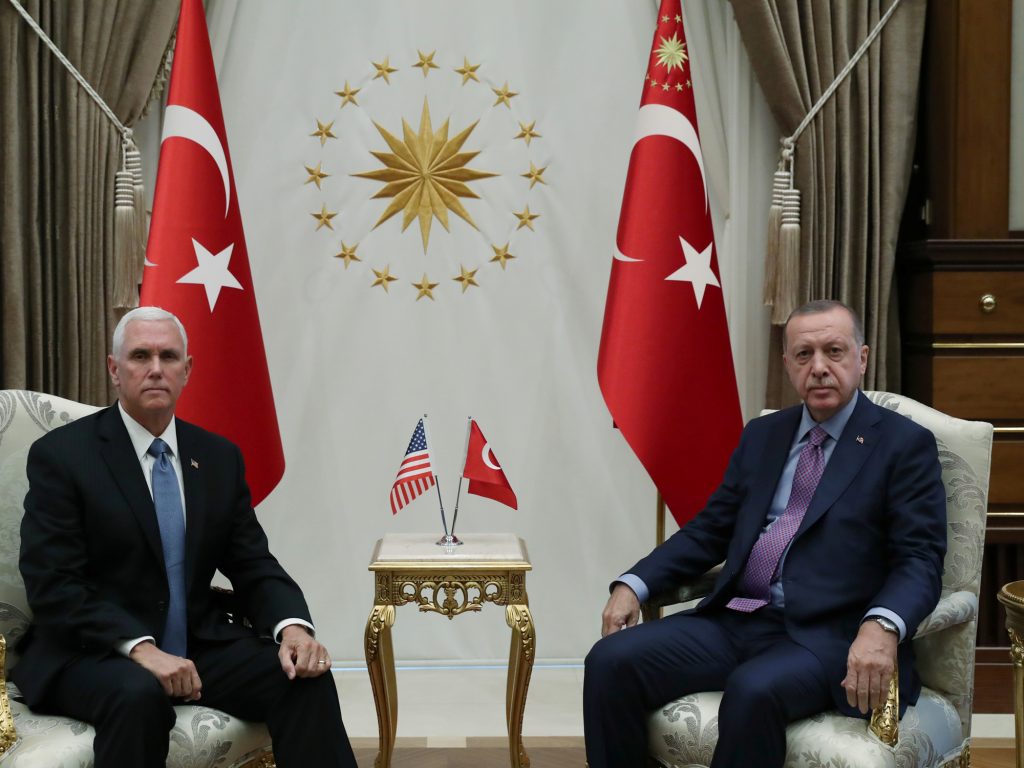
This week’s top reads reflect on what the Wall
Street Journal refers to as the “fiasco” of President Trump’s Syria withdrawal,
the precarious state of the global economy ahead of IMF-World Bank meetings and
Hong Kong’s continuing drama of street protests, now in its fourth month, and
how they will impact China and its relationship with the world. This
week’s must read is Adam Kirsch’s reflection in the weekend Wall Street Journal
on the threats to American patriotism and why they matter.
The final item this week focuses on an “inflection
point” of a different sort for my hometown baseball team, the Washington
Nationals, and why their coach Dave Martinez earned this week’s designation as
Person of the Week. His iconic quote will go down in baseball history, though
it also has broader applications: “Often bumpy roads lead to beautiful places.”
#1 THE KURDISH “FIASCO”
Editorial Board / WALL STREET JOURNAL
Trump’s betrayal of the Kurds is sickening to U.S. soldiers
David Ignatius / WASHINGTON POST
“What a fiasco,” declared a lead editorial in the Wall Street Journal this week. “Foreign policy blunders often take months or years to reveal their damaging consequences, but the harm from President Trump’s abrupt withdrawal of U.S. forces from northern Syria is playing out almost in real time.”
The Wall Street Journal concludes: “Mr. Trump won’t like to hear it, but the Syrian mess is hurting him at home too. Republicans who have stood by him through the Russia fight and more are questioning his judgment as Commander in Chief in an increasingly dangerous world. With impeachment looming, he can’t afford to alienate more friends.” Read More →
No columnist understands the stakes and players in Syria better than the Washington Post’s David Ignatius, who spent four trips there with U.S. military. So it’s worth reading his lament from a gathering of military and intelligence veterans, who understand better than most the sense of betrayal felt by the Kurds, “who suffered 11,000 dead and 24,000 wounded in a war that we asked them to fight” with its aim of destroying the Islamic State.
“It will go down in infamy,” one Army officer who served in the Syria campaign told Ignatius. “This will go down as a stain on the American reputation for decades.” Read More →
#2 THE “PRECARIOUS” GLOBAL ECONOMY
INTERNATIONAL MONETARY FUND
Global economic policymakers are playing with fire
Martin Wolf / FINANCIAL TIMES
Just in time for the annual IMF-World Bank powwow in Washington, the Trump administration this week imposed new, WTO-approved tariffs on the EU over Europe’s illegal subsidies of Airbus, starting a wrong war at the wrong time, as I argued months ago in this space – and again this week in the above commentary.
Amid the spiraling trade and geopolitical tensions around the world, the IMF’s 2019 world economic outlook strikes a downbeat tone, writing that “the pace of global economic activity remains weak.”
“Rising trade and geopolitical tensions have increased uncertainty about the future of the global trading system and international cooperation more generally, taking a toll on business confidence, investment decisions, and global trade,” the IMF economists write. “The outlook remains precarious.” Read More →
#3 HONG KONG’S CONTINUING DRAMA
Inside the battle for Hong Kong
Sue-Lin Wong / FINANCIAL TIMES
The FT’s Sue-Lin Wong reports from the streets of Hong Kong as the unrelenting protests against China’s communist government enter their fourth month. The world is underestimating the historic stakes of this slow-motion drama.
“The stakes for China’s future — and the way in which the world interacts with the superpower — could hardly be greater,” she writes. If the “protesters prevail in wresting concessions for a more democratic future for Hong Kong, it would indicate that Beijing is ready to tolerate diversity. If it cracks down again, as it did in 1989, it will not only jeopardise the viability of Asia’s financial hub but also create a new crisis in relations between China and the west.”
Regardless of how the protests evolve, Sue-Lin writes, the movement “is shaping a distinct Hong Kong identity among its followers, who increasingly see themselves as separate from mainland China. Beijing risks losing the hearts and minds of several generations — not just the young.” Read More →
#4 THE THREAT TO PATRIOTISM
American Patriotism is Worth Fighting For
Adam Kirsch / WALL STREET JOURNAL
Adam Kirsch’s thought-provoking reflection, on the cover of in the weekend Wall Street Journal’s Review section, provides this week’s must-read.
“American patriotism, like America itself, is a continuing experiment in the power of ideas to bring human beings together,” he writes in an essay that describes and defends the values-driven American patriotism that has unified the United States, a country whose history doesn’t allow it to form identity around shared ethnic origins or ancestral experiences.
A Gallup poll just before the Fourth of July this year, he reports, found that those who felt “extremely proud” to be American was at its lowest point in the poll’s 18-year history, landing at just 47%, down from 70% in 2003. He reflects on the two threats that face US politics today, from a populist right whose temptation is to see the nation “as an impediment to the interests of one’s own tribe, whether that is defined in terms of race, region, religion or class,” and from the left, whose temptation is “to believe that America ideals have never been anything more than window-dressing for racial or class self-interest.”
Writes Kirsch, “Both of these lines of attack lead to a rejection of American patriotism as the demanding ideal it has been and should be again. A society as large and diverse as our own requires that ideal: Americans may not always be able to love or understand each other, but as long as we all love our country we can enjoy a certain level of political trust.” Read More →
#5 A BASEBALL “INFECTION POINT”
Why Nationals Manager Dave Martinez never panicked
Jesse Dougherty / WASHINGTON POST
This column was created to track events that mark “defining moments” in global affairs. That said, forgive the author this week as he salutes an “inflection point” for his hometown baseball team, the Washington Nationals, which is going to its first World Series in franchise history.
That also makes manager Davey Martinez our person of the week. He was kind enough to also provide our quote of the week at the ceremony after the Nats won the National League pennant against the St. Louis Cardinals, one that is broadly applicable: “I’ll say this. Often bumpy roads by roads lead to beautiful places.”
Writing for the Washington Post, Jesse Dougherty, reports on the Nationals’ turbulent season and its improbable comeback, led by coach Dave Martinez.
“He read the calls for his job but never read the stories,” writes Dougherty. “He had a health scare in September and feared for his life but rejoined the club before doctors had cleared him. Ask the Nationals how they arrived in the thick of autumn, a title chance in hand, and there is a common thread: the 55-year-old Martinez never panicked when many managers would have. Then they found a beautiful place.” Read More →
Person of the Week
